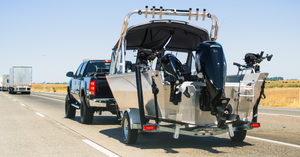When to replace bunk boards on a boat trailer?
If you're a boat owner, it's essential to keep your boat trailer in good condition to ensure safe transportation of your vessel. One of the most critical components of a boat trailer is the bunk boards, which provide support and protection for your boat during transport. However, these boards can wear out over time and need replacing. In this article, we'll discuss when and why you should replace your bunk boards, the factors that affect their lifespan, and how to choose the right replacement boards.
Understanding the importance of bunk boards
Bunk boards are a crucial part of any boat trailer. They provide a secure resting place for your boat during transportation, preventing it from shifting or bouncing around in transit. Bunk boards also offer protection against damage to the boat's hull, which can be caused by contact with the trailer frame or other parts of the trailer. Without proper support, your boat can be at risk of damage, and you may face costly repair bills.
What are bunk boards?
Bunk boards are long pieces of wood or plastic that run parallel to the trailer frame. They provide a stable platform for your boat to rest on, distributing the weight of the vessel and preventing it from rocking back and forth during transport. Bunk boards are typically covered with carpet or a non-skid material to provide traction for your boat's hull and protect it from damage.
It's important to note that not all bunk boards are created equal. When selecting bunk boards for your boat trailer, it's essential to choose boards that are the appropriate length and width for your vessel. If the boards are too short, your boat may not be adequately supported, and if they are too wide, they may cause unnecessary drag and reduce your trailer's overall efficiency.
Why are bunk boards crucial for your boat trailer?
Bunk boards are critical for your boat trailer's stability and safety during transport. Without proper support, your boat can shift and bounce around in transit, potentially causing damage to the hull or other components of the vessel. Bunk boards provide a secure resting place for your boat, ensuring that it arrives at its destination safely and without any damage.
Additionally, bunk boards can help to extend the life of your boat's hull by preventing it from coming into contact with the trailer frame or other parts of the trailer. Over time, repeated contact can cause scratches and other damage to the hull, which can lead to more significant problems down the line.
Properly installed and maintained bunk boards can also improve the overall efficiency of your boat trailer. By providing a stable platform for your boat to rest on, bunk boards can help to distribute the weight of the vessel more evenly, reducing the strain on your trailer's suspension and tires. This can result in a smoother ride and improved fuel efficiency, saving you money in the long run.
In conclusion
Overall, bunk boards are an essential component of any boat trailer. They provide crucial support and protection for your vessel during transport, helping to ensure that it arrives at its destination safely and without any damage. When selecting bunk boards for your boat trailer, be sure to choose boards that are the appropriate length and width for your vessel, and be sure to properly install and maintain them to ensure optimal performance.

Signs that your bunk boards need replacement
Proper maintenance of your boat trailer is essential to ensure a safe and successful boating experience. One of the most crucial components of your boat trailer is the bunk boards. These boards provide essential support for your boat during transit and while it's being loaded and unloaded. Over time, however, these boards can wear down and lose their effectiveness. So, how do you know when it's time to replace your bunk boards? Here are some signs to look out for:
Visible wear and tear
It's always a good idea to inspect your bunk boards regularly for visible signs of wear and tear. Exposure to the elements can cause the wood to splinter or crack, and the carpet to tear and fray. If you notice any of these signs, it may be time to replace the boards. Not only can worn-out bunk boards cause damage to your boat, but they can also pose a safety risk while you're on the road.
Rotting or water damage
Bunk boards are exposed to water and moisture regularly, which can cause rotting and water damage over time. If your boards feel soft or spongy, or you notice signs of mold or mildew, it's time to replace them. Not only can rotting bunk boards cause damage to your boat, but they can also pose a safety risk while you're on the road.
Sagging or loss of support
If your bunk boards are sagging or losing support, your boat may not be resting securely during transit. This can cause your boat to shift and bounce around, potentially causing damage to the hull or trailer. It's essential to ensure that your bunk boards are providing proper support to your boat to avoid any damage or accidents while you're on the road.
Difficulty loading or unloading your boat
If you're having trouble loading or unloading your boat, it may be a sign that your bunk boards are no longer providing proper support. This can make it challenging to get your boat onto or off the trailer, especially if you're doing it alone. Not only can this be frustrating, but it can also pose a safety risk if you're struggling to load or unload your boat.
Replacing your bunk boards is a crucial part of maintaining your boat trailer. By keeping an eye out for these signs and replacing your bunk boards when needed, you can ensure a safe and successful boating experience.
Factors affecting the lifespan of bunk boards
The lifespan of your bunk boards depends on several factors, including:
Material of the bunk boards
Bunk boards can be made from different materials, such as wood, plastic, or composite materials. The material you choose will affect the durability and lifespan of the boards.
For example, wood bunk boards are a popular choice among boat owners because they are strong, durable, and affordable. However, they require more maintenance than plastic or composite boards, such as regular cleaning and sealing to prevent rot and decay.
Plastic bunk boards, on the other hand, are low-maintenance and resistant to rot, mold, and mildew. They are also lightweight and easy to install. However, they may not be as strong as wood or composite boards and may not be suitable for larger boats.
Composite bunk boards are a newer option that combines the strength and durability of wood with the low-maintenance properties of plastic. They are resistant to rot, mold, and mildew and can withstand harsh weather conditions. However, they are more expensive than wood or plastic boards.
Frequency of use
The more often you use your boat and trailer, the more wear and tear your bunk boards will experience. If you use your boat frequently, you may need to replace your bunk boards more often.
Additionally, if you frequently launch and retrieve your boat in saltwater, your bunk boards may deteriorate more quickly due to the corrosive effects of saltwater.
On the other hand, if you only use your boat occasionally or store it on a lift, your bunk boards may last longer.
Exposure to harsh weather conditions
Exposure to harsh weather conditions, such as extreme heat or cold, can cause your bunk boards to deteriorate more quickly. If you live in an area with harsh weather, you may need to replace your boards more often than someone who lives in a milder climate.
For example, if you live in a hot and sunny climate, your bunk boards may become brittle and crack over time. If you live in a cold climate, your bunk boards may warp or split due to freezing and thawing cycles.
Proper maintenance and care
Proper maintenance and care can extend the lifespan of your bunk boards. Regularly inspecting and cleaning your boards can help prevent damage and deterioration.
Some tips for maintaining your bunk boards include:
- Inspect your boards regularly for signs of wear and damage, such as cracks, splinters, or rot.
- Clean your boards with soap and water to remove dirt and debris.
- Seal your wood boards with a marine-grade sealant to prevent rot and decay.
- Replace any damaged or worn boards promptly to prevent further damage to your boat.
By following these tips and taking proper care of your bunk boards, you can help ensure that they last as long as possible.
Choosing the right replacement bunk boards
When it comes time to replace your bunk boards, you'll want to choose the right ones for your trailer and boat. Here are some things to consider:
Types of materials available
Bunk boards can be made from various materials, such as wood, plastic, or composite materials. Each material has its advantages and disadvantages, so it's essential to choose the one that best suits your needs.
Wooden bunk boards are the most traditional option and are often the most affordable. However, they require regular maintenance to prevent rot and warping. Plastic bunk boards are a popular choice because they are durable and require little maintenance. Composite bunk boards are a newer option and are made from a combination of materials, such as fiberglass and plastic, to provide the best of both worlds.
Consider the type of water you'll be launching your boat in and the frequency of use when choosing the material for your bunk boards.
Selecting the appropriate size and length
It's crucial to choose bunk boards that are the appropriate size and length for your trailer and boat. You'll want to measure the width of your boat's hull and the distance between the trailer bunks to ensure a proper fit.
When selecting the length of your bunk boards, consider the weight of your boat and the number of bunks on your trailer. Longer bunk boards can provide better support for heavier boats, while multiple shorter bunk boards can distribute the weight more evenly.
Considering additional features and accessories
Additional features, such as non-skid material or extra padding, can provide additional protection for your boat during transport. Non-skid material can help prevent your boat from slipping on the bunk boards during launch or retrieval, while extra padding can protect your boat's hull from scratches and dings.
You may also want to consider accessories such as tie-down straps or winches to secure your boat to the trailer. These can help prevent your boat from shifting during transport and provide added peace of mind.
In conclusion, your boat trailer's bunk boards are essential for safely transporting your vessel. Regularly inspecting and maintaining your bunk boards can help extend their lifespan, but eventually, they will need replacing. By choosing the right replacement boards and ensuring proper maintenance and care, you can help protect your boat during transport for years to come.
Check out Forever Bunk Boards by Cuda Powersports. The last bunk board that you will ever need for your boat trailer. 


